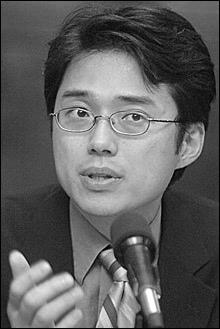
QUIET COUNCIL: An obscure 1947 law forbids Sam Yoon and other city councilors from publishing council activities. |
A seemingly simple attempt to provide Bostonians a small measure of good-government reform ran aground this past week — foiled by a peculiar 60-year-old state law, of obscure origin and intent, that City Hall, apparently, was violating even as its lawyers were citing its relevance.The saga began when at-large city councilor Sam Yoon proposed a couple of reforms, in light of recent ethics scandals, seeking to bring some sunlight into the often shadowy world of Boston city government.
One of Yoon's proposals was passed unanimously at the December 17 council meeting: a resolution calling for all city boards and commissions to publish their members, minutes, and schedule of meetings on the city's Web site.
That was a non-binding resolution, no less, which is about all the power the council has in relation to most other agencies.
But the council can pass binding ordinances governing its own behavior. So, Yoon proposed that the city council require itself to produce full, comprehensive minutes of each weekly meeting, and post them on the Web within two weeks — thus allowing ordinary citizens to learn what their elected representatives are actually doing up at City Hall.
Sounds fairly unobjectionable. Unfortunately, council staff discovered a problem: a state law, passed in May 1947, prohibits the city of Boston from publishing material from city-council debates.
At this point, you're probably thinking that this was merely an unintended consequence of some tangentially related law. Wrong. The law was officially titled "An Act prohibiting the publication of the substance of debates in the city council of the City of Boston."
The original purpose behind that law is, apparently, unknown, but it was passed at a rather extraordinary time in Boston's city governance. Mayor James Michael Curley was preparing to enter prison the following month. In addition, the council — then consisting of 22 members representing the wards — was mired in scandal, as Jack Beatty describes in his Curley biography, The Rascal King. In early 1947, Beatty writes, a Mattapan councilor openly accused others of taking kickbacks; councilor James Coffey of East Boston then leaped to his feet and declared that of course he and others were on the take: "I am probably the only one with guts enough to say I will take a buck."
Perhaps the law originated as a way to keep comments like that out of the public eye. In any event, efforts to reform both the office of mayor and the structure of the council were afoot, ultimately resulting in the city charter of 1949, under which we still operate.
Yoon's staff argues that developments of the past six decades have rendered the old law moot — although, given the recent arrest of councilor Chuck Turner for allegedly taking a bribe, perhaps things haven't changed all that much.
Yoon asked the city's legal office to look into it. Their opinion: the old law is still in effect. The city may not publish city-council debate. Yoon had to table the ordinance.
Some suspect that the city's legal opinion might have been less about the law, and more about Mayor Tom Menino's desire to keep the council's debates quiet — particularly as we enter a year in which one or more of those councilors may be running against Menino for mayor.